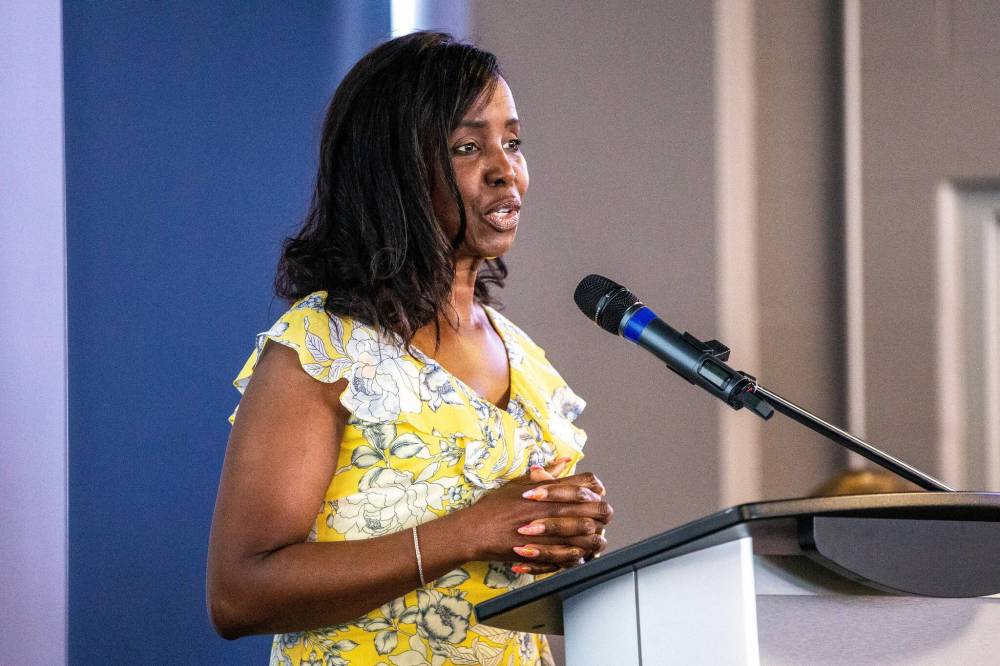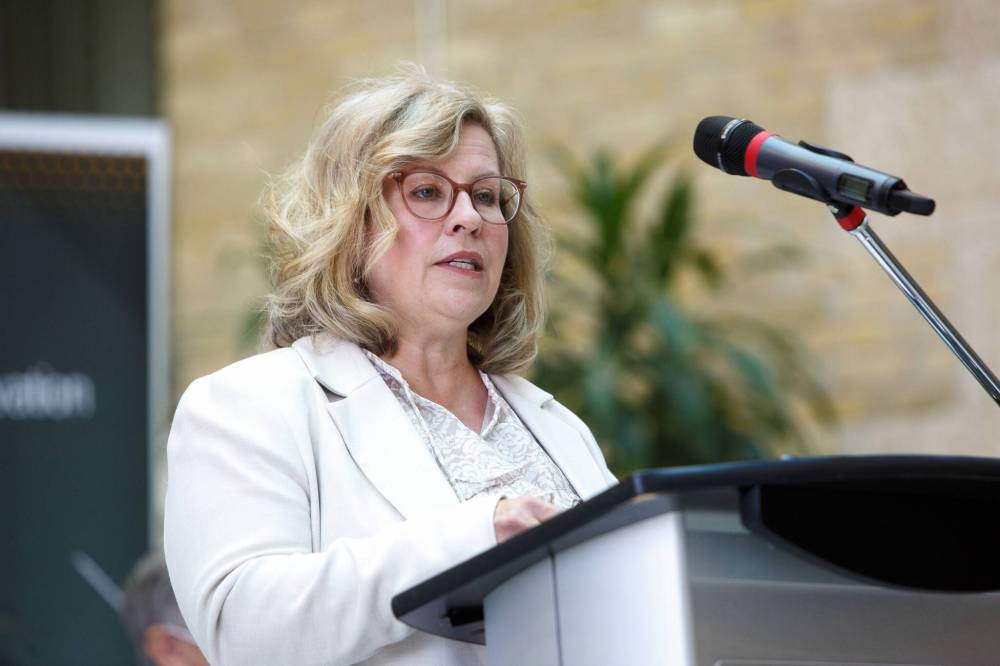Hundreds accept Manitoba health-care job offers after Philippines recruitment drive: province
Read this article for free:
or
Already have an account? Log in here »
To continue reading, please subscribe:
Monthly Digital Subscription
$0 for the first 4 weeks*
- Enjoy unlimited reading on winnipegfreepress.com
- Read the E-Edition, our digital replica newspaper
- Access News Break, our award-winning app
- Play interactive puzzles
*No charge for 4 weeks then price increases to the regular rate of $19.00 plus GST every four weeks. Offer available to new and qualified returning subscribers only. Cancel any time.
Monthly Digital Subscription
$4.75/week*
- Enjoy unlimited reading on winnipegfreepress.com
- Read the E-Edition, our digital replica newspaper
- Access News Break, our award-winning app
- Play interactive puzzles
*Billed as $19 plus GST every four weeks. Cancel any time.
To continue reading, please subscribe:
Add Free Press access to your Brandon Sun subscription for only an additional
$1 for the first 4 weeks*
*Your next subscription payment will increase by $1.00 and you will be charged $16.99 plus GST for four weeks. After four weeks, your payment will increase to $23.99 plus GST every four weeks.
Read unlimited articles for free today:
or
Already have an account? Log in here »
Hey there, time traveller!
This article was published 27/06/2023 (890 days ago), so information in it may no longer be current.
Reinforcements for Manitoba’s chronically understaffed health-care system are now scheduled to arrive from the Philippines in early September, as immigration and licensing requirements push their anticipated start date into the fall.
On Tuesday, Health Minister Audrey Gordon said 309 candidates — or nearly 90 per cent of all people offered a nursing and health-care aide job during the February recruitment mission to the Philippines — had accepted positions.
The workers will be living in 31 communities in the province and all health regions will benefit, Gordon said.
“This significantly exceeded our goals and expectations, and I look forward to welcoming those health-care professionals into our health system,” the minister said during a news conference at the Manitoba Legislative Building.
Health Minister Audrey Gordon (Mikaela MacKenzie / Winnipeg Free Press files)
Monika Warren, chief operating officer for provincial authority Shared Health, said the first recruits are expected to arrive in September.
Previously, the province had said nursing recruits would start landing in Winnipeg this summer, after having completed parts of the licensing process overseas (namely their clinical competency assessment).
As of Tuesday, only a handful of nursing recruits had applied to the College of Registered Nurses of Manitoba for licensure, and an unspecified number had a file open with the Provincial Nominee Program to begin the immigration process, according to officials.
Warren said the decision to move to Canada is a life-changing one, and recruits will have varying arrival timelines based on their ability to complete immigration requirements and tie up their personal lives in their home country.
“It’s going to be very individual: there are factors around personal choice, when flights get booked, I’m very hopeful that we will see the first group arriving and starting their mentorship and orientation time in early fall,” Warren said.
Monika Warren, chief operating officer for Shared Health (Winnipeg Free Press files)
“It’s really hard to predict, but we know we are putting the supports in place so that when they arrive we can start the ball rolling.”
According to officials, the Manitoba and Philippine governments have agreed on an immigration framework to pre-approve the essential terms of each candidate’s offer of employment, which was necessary for the recruit apply to the nominee program and receive a work permit support letter.
The provincially issued support letters are needed to apply to Immigration, Refugees, and Citizenship Canada. It issues a work permit, which is required by the Philippine government to approve exit visas for nationals who live and work abroad.
Recruitment process
Shared Health sent 348 letters of interest to “the vast majority” of internationally trained health-care workers its representatives interviewed during a five-day trip overseas, during which Manitoba officials conducted interviews with pre-screened applicants.
They offered jobs to more than 150 registered nurses, 77 licensed practical nurse equivalents, and 110 health-care aides.
Manitoba Labour and Immigration Minister Jon Reyes and Ken Borce, chief of clinical operations for CancerCare Manitoba, both participated in the recruitment mission and are of Filipino descent.
Shared Health sent 348 letters of interest to “the vast majority” of internationally trained health-care workers its representatives interviewed during a five-day trip overseas, during which Manitoba officials conducted interviews with pre-screened applicants.
They offered jobs to more than 150 registered nurses, 77 licensed practical nurse equivalents, and 110 health-care aides.
Manitoba Labour and Immigration Minister Jon Reyes and Ken Borce, chief of clinical operations for CancerCare Manitoba, both participated in the recruitment mission and are of Filipino descent.
“We were immensely impressed by the quality and qualifications of the candidates we encountered and, consequently, we extended letters of interest to the vast majority of applicants, moving them forward to the next stage of the process,” Borce said.
Applicants were categorized in three streams: RNs, LPNs and health-care aides.
According to Shared Health, pending the successful completion of immigration and licensure requirements, internationally educated health-care providers recruited from the Philippines will be represented in 31 communities across all health regions.
Broken down by health region, the 309 people who have accepted letters of offer will be located as follows:
— Winnipeg (includes WRHA facilities and HSC Winnipeg): 116;
— Prairie Mountain: 64;
— Southern Health: 44;
— Interlake-Eastern: 48;
— Northern Health: 37.
However, a modernized licensure stream for internationally educated nurses, intended to allow recruits to complete some of their licensing requirements abroad and shave about three months off the registration process, still isn’t ready.
Instead, the government will spend $100,000 to send a team of nursing faculty assessors from the University of Manitoba to Manila in July to complete an in-personal clinical competency assessment (CCA) with about 20 recruits.
The group will also work with the World Citi Colleges to establish the promised virtual assessment program, which will allow nurse recruits to take the CCA while overseas and potentially complete some bridging courses remotely.
CRNM spokesman Martin Lussier said it remains unclear to the college when applicants are expected to arrive in Manitoba, and there is no clear date for when the the virtual CCA will be implemented.
The CCA is used to determine whether a nurse requires bridging courses that must be completed before the candidate can write the NCLEX-RN exam, if they have not already passed it. It takes about four to six weeks for a CCA report to be prepared for the college’s review.
“We have received a small handful of applications so far that remain in process. We expect that further applications will start to come in as the immigration processes and other aspects of the recruitment initiative continue to move forward,” Lussier said in an emailed statement to the Free Press.
“Work is being undertaken to look at enabling the virtual delivery of courses in the (nurse re-entry programs), but that remains in progress depending on funding commitments and other external factors.”
“The trajectory of the timeline is not out of the ordinary. These are individuals that are coming from a country that is thousands of miles away.”–Health Minister Audrey Gordon
Despite setbacks launching the expedited licensing stream and delays moving the recruits through the immigration process, Gordon said she is pleased with how the process has unfolded and the current timeline for their arrival.
The new nurses will have the opportunity to work at the bedside as undergraduate nurse employees while completing bridging courses in Manitoba, she noted.
“The trajectory of the timeline is not out of the ordinary. These are individuals that are coming from a country that is thousands of miles away, there are processes in immigration that have to be completed in their home country, also Canadian immigration, so it is not uncommon for this timeline,” she said.
Gordon noted the province is also conducting outreach to internationally educated nurses residing in Manitoba to ensure they are aware of the programs and initiatives available to them to achieve registration in the province.
Manitoba Liberal Leader Dougald Lamont said the Tory government should be prioritizing the health-care workers and internationally educated professionals who are already in Manitoba and bringing them into the system.
“It’s a big splashy announcement, but it’s not rolling up their sleeves and really doing what needs to get done because our health-care system is still in crisis,” the St. Boniface MLA said.
“You gotta clean up your place before you ask people over. There’s lots of stuff that need to be done to fix our health-care system up before we invite all these people in, because otherwise, we’re just chewing them up and spitting them out.”
Opposition health critic Uzoma Asagwara called the government’s announcement a failure to adequately staff the health-care system.
“It’s not bringing health-care workers to Manitoba bedsides any faster,” the NDP MLA for Union Station said in a prepared statement. “The minister of health promised that internationally educated health-care professionals would arrive in Manitoba and be ready to start work by the summer.
“Today’s announcement represents more delays.”
— with files from Katie May
danielle.dasilva@freepress.mb.ca
History
Updated on Tuesday, June 27, 2023 6:16 PM CDT: Updates with final copy, page formatting








